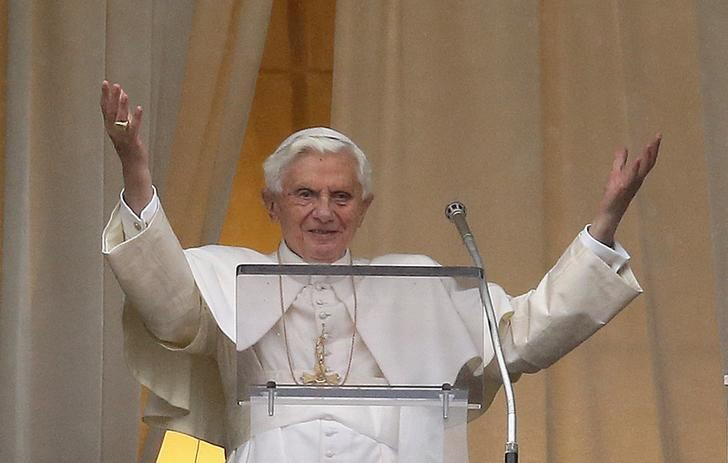Pope Benedict XVI Resigns, Papacy Still A Guide For Our Times
Opinion

Less than eight years ago, the last time the seat of the Roman Pontiff was vacant, I happened to be living in Rome.
A college sophomore on a study abroad program with my university, and a lifelong Catholic, I was almost as young in my faith as I was in my years. In my short life, Pope John Paul II was the only pope I’d known.
He was like a grandfather to me -- a leader who imparted invaluable lessons, despite my inability to fully understand them, considering I had not lived through the historical context from which many of those lessons came.
And when, on April 19, 2005, Pope Benedict XVI was named the new pope, I stood in St. Peter’s Square knowing very little of the man who has since, like his predecessor, filled a paternal role in my life. This pope, however, was more like a father to me; he wrestled with the same modern-world complexities I was wrestling with.
So today, as a young Catholic professional living in Washington D.C., and on the day he announced his resignation from the papacy, I wish to offer gratitude for Benedict XVI’s instruction on how to truly live in the complexity of our present time.
At the time he rose to the papacy, Facebook and the age of social media were just beginning to emerge. Benedict XVI quickly praised these new mediums for their ability to foster international dialogue, to build new communities, and to build upon our natural desire for connectedness in an increasingly mobile society. At the age of 85, he was the first pope to join Twitter, gaining more than 1.5 million followers in less than three months.
Dedicating several messages and addresses to the topic of social media, Benedict XVI exhibited an admirable grasp of our digital world. And yet, even as he engaged in social media, he cautioned all social media users to not let in-person friendships or human dignity suffer at the expense of our online interactions.
His instructions stunned the high school students I’ve taught, who told me they heeded his advice a bit more seriously on account of how “cool” it is that the pope had taken the time to learn their language. His example in actually engaging the digital world has no doubt been a compelling factor in the number of bishops and priests who joined the ranks of Facebook and Twitter users as a part of their outreach to their communities.
And while not a political figure, Benedict XVI’s teachings have had an impact on members of the Church, who are actively engaged in the political process.
He has affectionately been dubbed by some as the “Green Pope” for his frequent urgings that all of humanity be concerned with the preservation of the environment, and to pay particular attention to climate change. Both issues are specifically -- generally -- of significant importance to the American political left.
While many on the American political right would like to give precedence to other issues, Benedict XVI noted that “[t]he concerns for nonviolence, sustainable development, justice and peace, and care for our environment are of vital importance for humanity.”
And he called both political sides to understand that “they cannot, however, be understood apart from a profound reflection upon the innate dignity of every human life from conception to natural death: a dignity conferred by God himself and thus inviolable.”
For the American Catholic, Benedict XVI’s reflections on these, and so many of the Church’s other teachings have made it clear: Our participation in the voting booth and in the political arena is not simple.
There is a tension between how the political arena has categorized and prioritized issues of human interest, and how our faith understands these same issues. But as Benedict XVI has shown myself and so many of my peers, our continued exploration of the Church’s teachings will not lead us to give up on politics, but rather push for new ways to extend beyond the traditional labels of our democratic process for the common good.
Last, but perhaps most important, Benedict XVI has taught us about love. In his inauguration address, he reminded us that “[e]ach of us is willed, each of us is loved, each of us is necessary.”
In his first encyclical, Deus Caritas Est -- translated to mean “God is Love” -- he taught us love’s ability to compel us to recognize that "[we] can give to others much more than their outward necessities; [we] can give them the look of love which they crave.”
Subsequent homilies and encyclicals expanded upon these themes, exhibiting for us that love cannot be trivialized or neatly categorized in the ways our world would like.
His acceptance and joyful endurance of the papacy, though it was well known that he had wished to retire prior to John Paul II’s death, taught us how to love. He reinforced in his travels and continued guidance of the Church that love will often call us to places we do not always wish to go.
His resignation emphasized that love requires both courage and humility -- courage to do that which few have done before him, and humility to recognize and accept that the demands of our time are more than he can continue to give.
And so, like good leaders often do, Benedict XVI’s papacy leaves me and my peers with the inspiration to utilize our unique gifts and talents, with love, courage, and humility, for the cause of all that is good as we navigate this complex world we live in.
Meg T. McDonnell is the communications director for the Chiaroscuro Foundation. Formerly, she was a religion teacher in a Catholic high school.
© Copyright IBTimes 2024. All rights reserved.





















